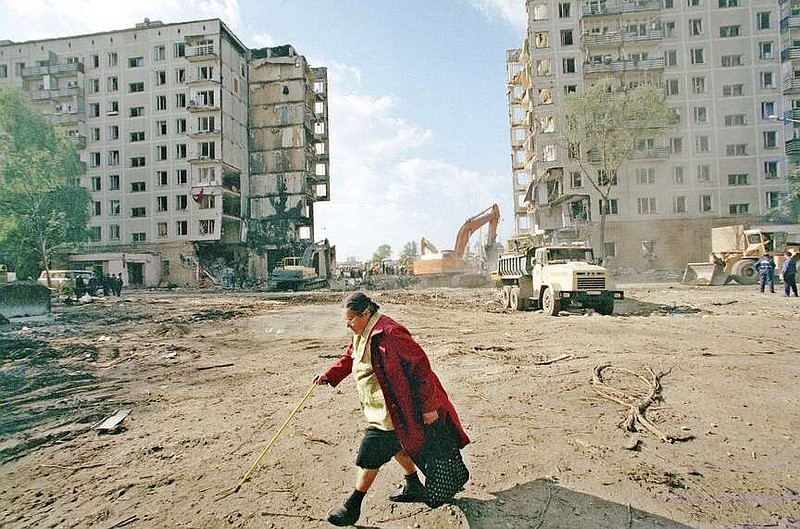Friday's attack on a Moscow concert hall where armed men opened fire and set the building ablaze was the latest in a long series of bombings and sieges that have unsettled and angered Russians during Vladimir Putin's nearly quarter-century as either prime minister or president.
The attack on the Crocus City Hall, for which an Islamic State faction in Afghanistan claimed responsibility, followed several years of quiet.
Over a two-week period in September 1999, four apartment buildings were bombed in Moscow and two other cities, killing a total of 307 people. Officials blamed militants from the separatist region of Chechnya.
But serious doubts about the claim of Chechen involvement arose when officials reported sacks of explosives attached to a detonator in an apartment building in Ryazan. Three men with cards identifying them as members of the Federal Security Service, which Putin had headed until becoming prime minister a month prior, were detained on suspicion of planting the material.
The security service later claimed it had been conducting a drill and the sacks contained harmless material. But by then, Putin had used the incident to justify launching an air assault on the Chechen capital, beginning the second full-scale war in the region.
About 40 Chechen militants on Oct. 23, 2002, stormed a Moscow theater where a popular musical was underway, taking some 850 people hostage and planting explosives in the auditorium.
Russian special forces elected not to storm the theater because of its difficult layout and the presence of explosives in the hall. Over the next two days, prominent politicians and journalists arrived at the theater to negotiate with the hostage-takers.
On the morning of the fourth day, Russian forces pumped an unidentified sleeping gas into the building's ventilation system, killing the assailants. At the same time, 132 hostages died, mostly from the effects of the gas.
Assailants directed by Chechen warlord Shamil Basayev stormed into a school in the Russian town of Beslan, near Chechnya, on the morning of Sept. 1, 2004, the first day of school, when many children were accompanied by their parents. The number of hostages held by the militants was estimated at about 1,100.
Two days later, a severe explosion shook the building and Russian forces rushed in. When the fighting was over, 334 civilians were dead or fatally wounded, more than half of them children, along with 31 attackers.
A week before the Beslan school seizure, suicide bombers destroyed two airliners on the same night, killing all 90 passengers and crew aboard. Both planes had taken off from Moscow's Domodedovo Airport.
Suicide bombers also attacked the airport in 2011, killing 37 people.
In 2015, a bomb blew up a Russian charter airliner flying tourists home from the Egyptian resort Sharm el-Sheikh, killing all 224 passengers. A faction of the Islamic State claimed responsibility.
Russia's subways, with large numbers of people in restricted spaces, were also frequent targets.
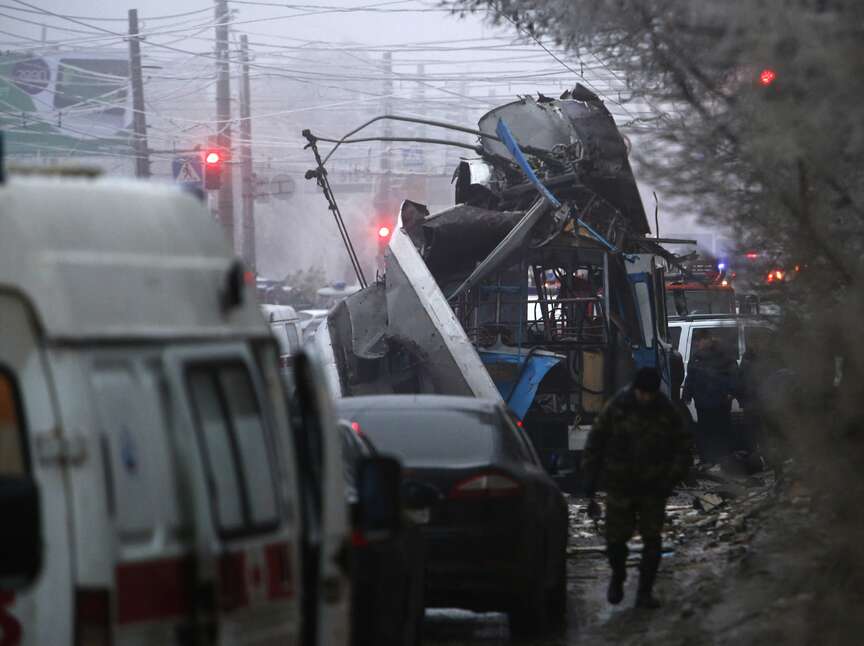 FILE - Experts and police officers examine a site of a trolleybus explosion, in Volgograd, Russia, Monday, Dec. 30, 2013. The attack on a Moscow concert hall in which armed men opened fire and set the building ablaze, killing over 130 people, was the latest in a long series of bombings and sieges that have unsettled and outraged Russians during Vladimir Putin's nearly quarter-century as either prime minister or president. (AP Photo/Denis Tyrin, File)
FILE - Experts and police officers examine a site of a trolleybus explosion, in Volgograd, Russia, Monday, Dec. 30, 2013. The attack on a Moscow concert hall in which armed men opened fire and set the building ablaze, killing over 130 people, was the latest in a long series of bombings and sieges that have unsettled and outraged Russians during Vladimir Putin's nearly quarter-century as either prime minister or president. (AP Photo/Denis Tyrin, File)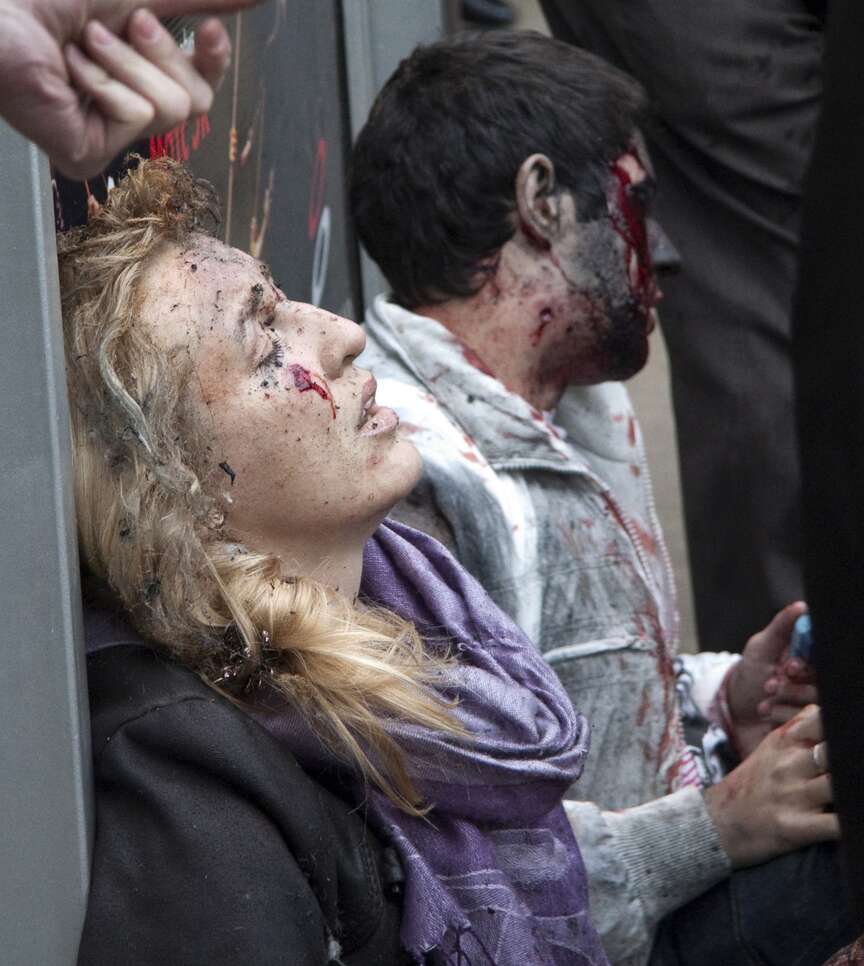 FILE - Commuters injured by a bomb blast at the Park Kultury subway station in Moscow wait for medical care just outside the station shortly after the explosion, March 29, 2010. The attack on a Moscow concert hall in which armed men opened fire and set the building ablaze, killing over 130 people, was the latest in a long series of bombings and sieges that have unsettled and outraged Russians during Vladimir Putin's nearly quarter-century as either prime minister or president. (AP Photo/Egor Barbatunov, File)
FILE - Commuters injured by a bomb blast at the Park Kultury subway station in Moscow wait for medical care just outside the station shortly after the explosion, March 29, 2010. The attack on a Moscow concert hall in which armed men opened fire and set the building ablaze, killing over 130 people, was the latest in a long series of bombings and sieges that have unsettled and outraged Russians during Vladimir Putin's nearly quarter-century as either prime minister or president. (AP Photo/Egor Barbatunov, File)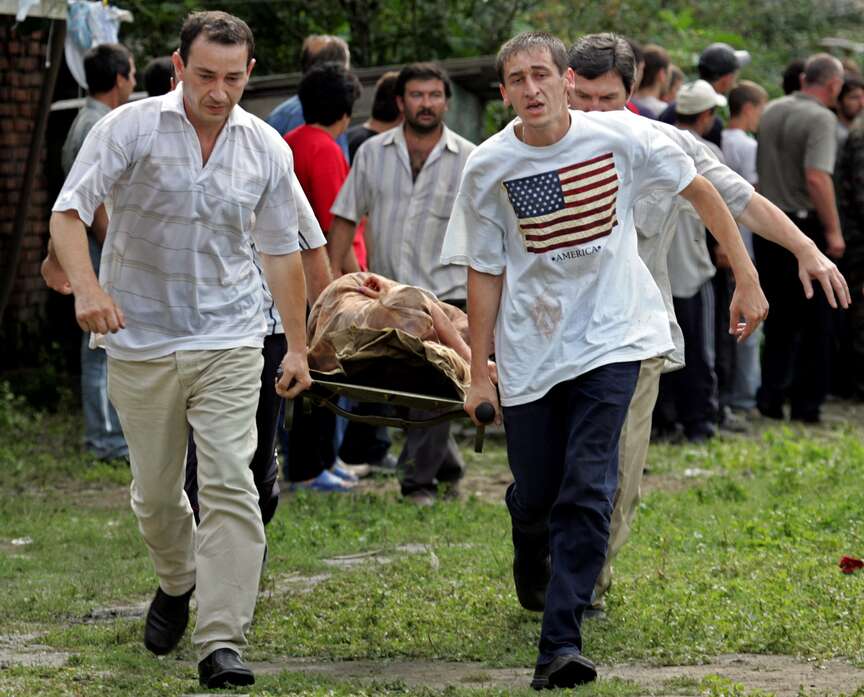 FILE - People carry a stretcher with a victim from a seized school in Beslan, North Ossetia, Friday, Sept. 3, 2004. The attack on a Moscow concert hall in which armed men opened fire and set the building ablaze, killing over 130 people, was the latest in a long series of bombings and sieges that have unsettled and outraged Russians during Vladimir Putin's nearly quarter-century as either prime minister or president. (AP Photo/Ivan Sekretarev, File)
FILE - People carry a stretcher with a victim from a seized school in Beslan, North Ossetia, Friday, Sept. 3, 2004. The attack on a Moscow concert hall in which armed men opened fire and set the building ablaze, killing over 130 people, was the latest in a long series of bombings and sieges that have unsettled and outraged Russians during Vladimir Putin's nearly quarter-century as either prime minister or president. (AP Photo/Ivan Sekretarev, File)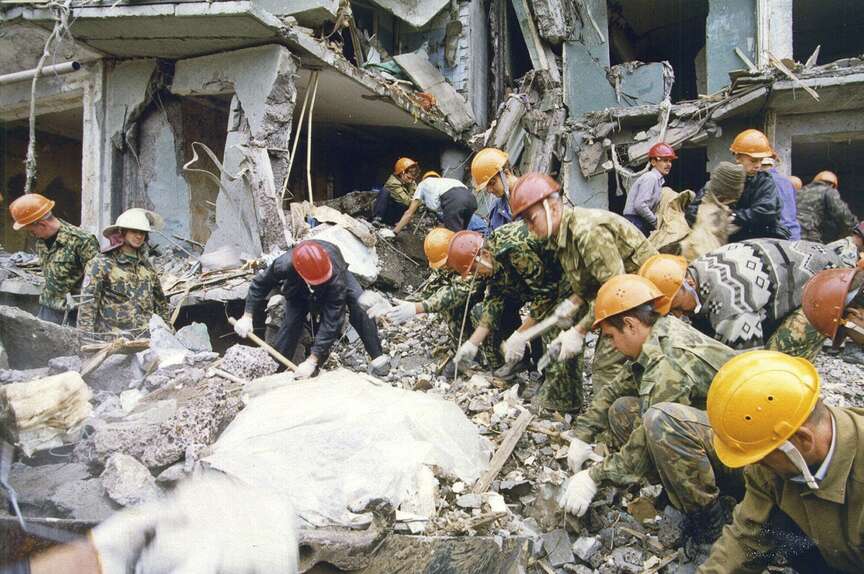 FILE - Rescue workers shuffle the rubble at a devastated apartment building in the city of Volgodonsk, close to Russia's Caucasus Mountains region, Thursday, Sept. 16, 1999. The attack on a Moscow concert hall in which armed men opened fire and set the building ablaze, killing over 130 people, was the latest in a long series of bombings and sieges that have unsettled and outraged Russians during Vladimir Putin's nearly quarter-century as either prime minister or president. (AP Photo/Sergei Venyavsky, File)
FILE - Rescue workers shuffle the rubble at a devastated apartment building in the city of Volgodonsk, close to Russia's Caucasus Mountains region, Thursday, Sept. 16, 1999. The attack on a Moscow concert hall in which armed men opened fire and set the building ablaze, killing over 130 people, was the latest in a long series of bombings and sieges that have unsettled and outraged Russians during Vladimir Putin's nearly quarter-century as either prime minister or president. (AP Photo/Sergei Venyavsky, File)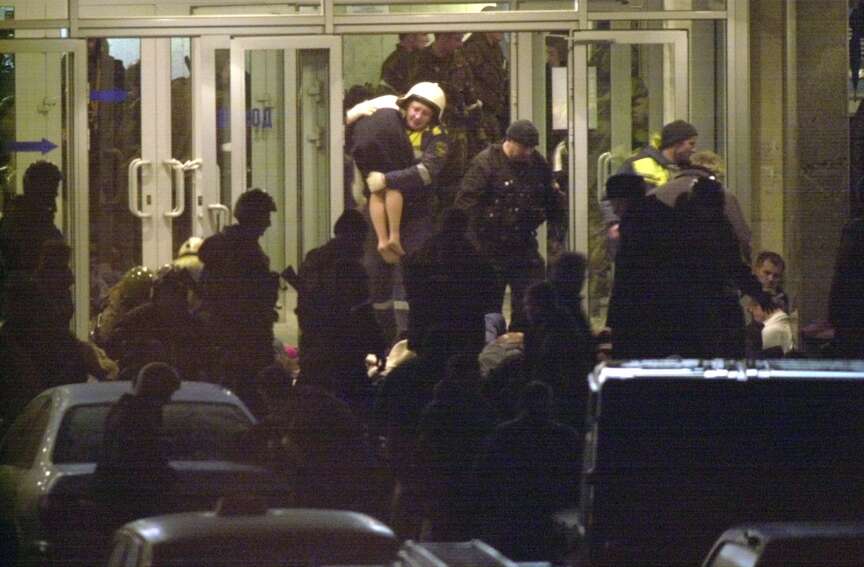 FILE - An Interior Ministry rescue worker carries a body out of the theater where hundreds of hostages were being held by Chechen rebels, in Moscow, Saturday, Oct. 26, 2002. The attack on a Moscow concert hall in which armed men opened fire and set the building ablaze, killing over 130 people, was the latest in a long series of bombings and sieges that have unsettled and outraged Russians during Vladimir Putin's nearly quarter-century as either prime minister or president. (AP Photo/Dmitry Lovetsky, File)
FILE - An Interior Ministry rescue worker carries a body out of the theater where hundreds of hostages were being held by Chechen rebels, in Moscow, Saturday, Oct. 26, 2002. The attack on a Moscow concert hall in which armed men opened fire and set the building ablaze, killing over 130 people, was the latest in a long series of bombings and sieges that have unsettled and outraged Russians during Vladimir Putin's nearly quarter-century as either prime minister or president. (AP Photo/Dmitry Lovetsky, File)